Siemens Energy's holistic approach
Jennifer Hooper, Senior Vice President at Siemens Energy, details a new pilot methanol and fuel cell solution of the superyacht sector …
The superyacht industry finds itself at an environmental crossroads as it searches for viable energy transition solutions. With the recent decision by the European Parliament to push for dramatic cuts in greenhouse gas (GHG) emissions – a daunting 2% by 2025, 20% by 2035, and 80% by 2050, compared to 2020 levels – the urgency is clear.
Notably, the International Maritime Organization (IMO) has taken a step further, aiming for full decarbonization by 2050. These goals pose significant challenges, especially for operators of container vessels, ferries, and large superyachts emphasising the urgent need to depart from traditional heavy fuel oil and diesel generator drive solutions.
But, as the age-old adage goes, necessity is the mother of invention. Siemens Energy hopes to be one of the key drivers of a decarbonised marine industry. Together with fuel cell supplier Advent Technologies Holdings Inc., they have integrated methanol fuel cell systems for onboard power generation.
SuperyachtNews speaks with Jennifer Hooper, Senior Vice President at Siemens Energy. With a 50m pilot yacht project underway, how does the marine industry giant see the application of these technologies in the superyacht sector?
 Jennifer Hooper, Senior Vice President at Siemens Energy
Jennifer Hooper, Senior Vice President at Siemens Energy
Siemens Energy's methanol fuel cell technology, integrated in 2021 for commercial applications, is now undergoing testing for integration into superyachts' power supply systems for hotel functions. The European Commission is funding this project due to its significant potential in the maritime decarbonization sector. The ultimate objective is to power a superyacht entirely using green methanol, harnessing a combination of fuel cells and internal combustion engines.
The 50m superyacht project will initially use Advent Technologies’ methanol-powered fuel cells, chosen as a sustainable and reliable auxiliary power source with improved power density. This marine fuel cell solution will be used as a hybrid (diesel engine combined with fuel cells) power source, enabling cleaner electricity generation compared to conventional diesel engines and generators.
“In the first three quarters of 2022, approximately 61 per cent of all new build orders in shipping by tonnage were alternative fuel capable, with methanol accounting for a growing portion,” states Hooper. “We also want to see superyachts powered entirely by methanol, but we have to think about where we are going to get the methanol from.”
“Maritime is just one part of the business and the wider strategy of EAD (Electrification Automation Digitalization) at Siemens Energy. We have a holistic approach to decarbonization, and are developing a diverse range of partnerships,” says Hooper.
Liquid Wind, a Swedish technology startup, is one such partnership, which resulted in a final investment decision (FID) by Ørsted for FlagshipOne. The operations will start in 2025 to produce 50,000 tonnes of e-methanol per year to aid in the decarbonization of the global shipping industry. The next Flagships are standardized for 100,000 tonnes of e-methanol per year.
Siemens Energy has supplied the battery technology that drives a growing fleet of zero-emission commercial vessels and ferries worldwide. However, Hooper explains, for superyachts with standard design and potential ocean-going operational profile, batteries may be used in hybrid configurations together with other carbon-free solutions such as fuel cells. A total switch to batteries is seen as unlikely due to constraints in space and weight without a significant evolution in battery technology. Batteries simply take up too much space and add too much weight.
The Siemens Energy yacht system uses green or bio methanol, depending on the source, which then supplies a fuel cell that drives electric propulsion. Methanol offers the significant advantage of not contributing to overall greenhouse gas emissions. While carbon is produced, this is carbon that had already been sequestered from the atmosphere during the methanol production cycle.
“Energy efficiency is key,” says Hooper. “We are also looking for 50 per cent efficiency from the fuel cells from Advent Technologies, which is at least 30 or 40 per cent more efficient compared to the standard diesel engine. So, the disadvantage of the lower energy density of methanol can be compensated by the higher efficiency of the fuel cell system.”
“Without an analytic approach, we are not able to decarbonize the marine industry. If you don’t think holistically, whenever we solve one problem, we create another in another part of the process.”
After completing this project, Siemens Energy plans to develop similar solutions with Advent Technologies for a broader range of business applications beyond maritime, such as industrial power solutions. The technology roadmap to increase the current nominal value of produced electricity for each fuel cell module ten-fold will allow the use of fuel cell solutions as a primary electricity source for propulsion systems throughout the maritime sector.
Dr. Vasilis Gregoriou, Chairman and CEO of Advent Technologies, concludes: “There is an increasing consensus in the market that high-temperature proton exchange membrane (HT-PEM) technology is highly suitable for maritime applications, owing to its compatibility with methanol and other eFuels. The significant interest that our HT-PEM Serene fuel cells have received from the maritime industry over the past several months is encouraging and reinforces our potential to contribute to the industry's goal.”
NEW: Sign up for SuperyachtNewsweek!
Get the latest weekly news, in-depth reports, intelligence, and strategic insights, delivered directly from The Superyacht Group's editors and market analysts.
Stay at the forefront of the superyacht industry with SuperyachtNewsweek
Click here to become part of The Superyacht Group community, and join us in our mission to make this industry accessible to all, and prosperous for the long-term. We are offering access to the superyacht industry’s most comprehensive and longstanding archive of business-critical information, as well as a comprehensive, real-time superyacht fleet database, for just £10 per month, because we are One Industry with One Mission. Sign up here.
Related news
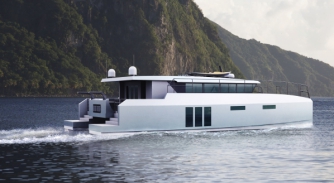
EMS completes methanol propulsion design for Archipelago Yachts
The marine systems designer says it is breaking new ground in the understanding of methanol-powered engines for yachts whilst working on the project
Technology
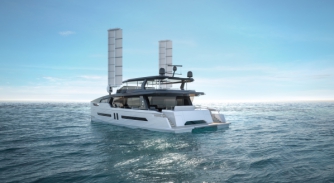
ALVA Yachts announces OCEAN ECO 90 H2
The 27.5m fuelless catamaran will be available with a fully electric drive, hydrogen fuel cells and wing sails
Fleet
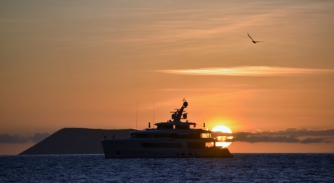
Monitoring the methanol method
Chris Chatterton, COO of the Methanol Institute, offers an outside perspective on a growing energy market for new-build yachts
Technology
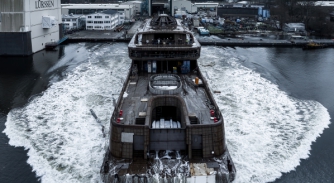
Lürssen launches Project Cosmos
The vessel measures an impressive 114m and will be the first Lürssen yacht to feature fuel cell technology
Business
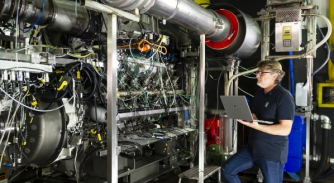
Rolls-Royce successfully tests mtu engines with pure hydrogen
Rolls-Royce has successfully tested a 12-cylinder gas variant of the MTU Series 4000 L64 running on 100% hydrogen
Business
Related news
ALVA Yachts announces OCEAN ECO 90 H2
2 years ago
Monitoring the methanol method
2 years ago
Lürssen launches Project Cosmos
2 years ago
NEW: Sign up for
SuperyachtNewsweek!
Get the latest weekly news, in-depth reports, intelligence, and strategic insights, delivered directly from The Superyacht Group's editors and market analysts.
Stay at the forefront of the superyacht industry with SuperyachtNewsweek



